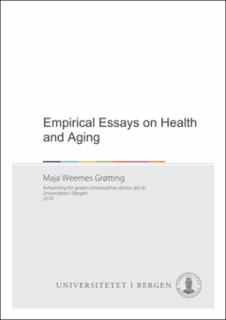| dc.description.abstract | This thesis is composed of four chapters: One introductory chapter and three chapters that each include one of the three essays that make up the main body of the thesis. Common features of the essays are empirical assessments of health in later life and the econometrical challenges caused by selection–either in the form of people self-selecting into “treatment” or in the form of sample-selection in the data applied. The first essay, co-authored with Signe A. Abrahamsen, is concerned with how increased access to publicly provided eldercare affects the immediate and long-term health of informal caregivers. The evidence of the causal effects of care responsibilities on health is limited, especially for long-term outcomes. In this essay, we estimate long-term effects of a formal care expansion for the elderly on the health of their middle-aged daughters. We exploit a reform in the federal funding of formal care for Norwegian municipalities that caused a greater expansion of home care provision in municipalities that initially had lower coverage rates. We find that expanding formal care for the elderly reduced sickness absence for single-child daughters of lone parents in the short run, and that the decrease seems to be driven by absences due to musculoskeletal disorders and psychological disorders. When assessing long-term health outcomes for the same group of daughters, we find that, overall, long-term health is not affected. The second essay, co-authored with Otto S. Lillebø, is concerned with the health effects of retirement and the potential heterogeneity in these effects according to socioeconomic status. Using a local randomized experiment that arises from the statutory retirement age in Norway, we estimate causal effects of retirement on health across socioeconomic status. We apply health information from full population administrative registers and from survey data to investigate the effects of retirement on acute hospital admissions, mortality, and a composite physical health score. Our results show that retirement has a positive effect on physical health, especially for individuals with low socioeconomic status. We find no retirement effects on acute hospitalizations or mortality in general. However, our results suggest that retirement leads to reduced likelihood of hospitalizations for individuals with low socioeconomic status. Finally, we show that the positive health effects are driven by reduced pain and reduced health limitations in conducting daily activities. Our findings highlight heterogeneity in the health effects across socioeconomic status and across subjective and objective measures of health. The third essay analyzes the extent and consequences of health-related non-response in survey data, defined as either initial non-response or attrition across waves. The first part of the paper provides a thorough description of the initial non-response and attrition between waves in the Norwegian Study on Life Course, Aging, and generation (NorLAG), a typical survey sample. In the second part, the potential bias from sample selection is examined using econometric analyses of educational differences in health across age as a case study. This is an empirical application that is believed to be particularly prone to bias from health selection, as non-response correlates with both health, education, and age. I make use of a sample of Norwegian older adults and register data that cover the full population to make various assumptions about the selection process and find that using population weights, inverse probability weights, the Heckman selection model, and a Copula selection model does not produce substantially different estimates. Across all models, educational differences in health converge in old age, as is commonly found in analyses that use survey data. This convergence is also found using the register data. Taken together, these results suggest that survey data are well-suited to describe patterns of health inequalities as they manifest in the population. Finally, the register data reveal that healthy survivor bias among the low educated is an important factor driving the convergence in health inequalities in old age. | en_US |
